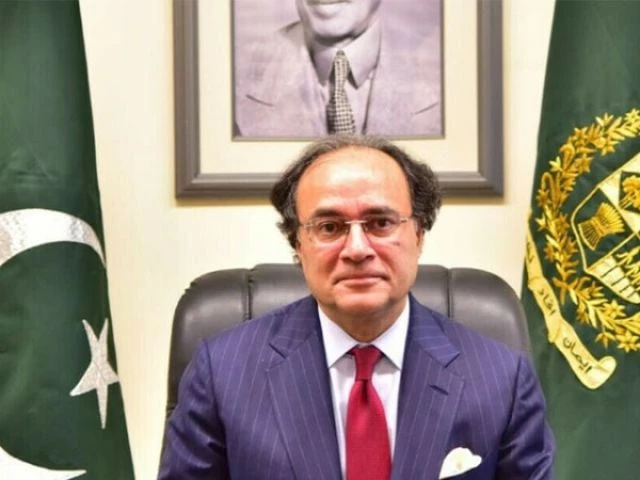Cashless economy a necessity for fiscal resilience: FinMin
Aurangzeb calls for leveraging tech to simplify financial access for individuals, businesses

Federal Minister for Finance Muhammad Aurangzeb on Tuesday chaired a high-level meeting at the Finance Division to discuss a host of measures for advancing Pakistan's transition to a digital and less cash-dependent economy.
The meeting brought together senior representatives from Pakistan's financial sector, including commercial banks, development finance institutions, regulators and investment experts, who form the core of a committee set up by the minister for crafting recommendations to support Pakistan's transition towards the digital economy.
Participants engaged in comprehensive discussions on a series of key proposals aimed at fostering greater adoption of digital payments. They reached consensus on a range of measures intended to expand access to digital financial services, encourage the use of digital transactions and reduce reliance on cash in everyday economic activity.
Among the key areas of the agreement was the need to ensure that digital payment options were widely available and accessible across various sectors, including retail, services and public sector transactions. The participants supported steps that would encourage broad-based interoperability by particularly leveraging the Raast instant payment system, which would lead to improved consumer choice in using digital payment platforms.
It was agreed that creating a more level playing field between cash and digital transactions was essential and incentive structures should be rebalanced to make digital payments further attractive and cost-effective for both consumers and businesses. The importance of improving cost structures related to digital transaction infrastructure, including merchant acquisition and service provision, was highlighted as a priority to enable wider outreach, especially for small merchants and underserved communities.
The finance minister, while welcoming the committee's recommendations, emphasised that digitalisation was central to Pakistan's economic modernisation agenda. He noted that increasing the footprint of digital payments would significantly enhance financial transparency, promote inclusion and improve efficiency in both public and private sector operations.
Aurangzeb stressed that moving towards a cashless economy was not simply a policy aspiration, but a practical necessity for long-term fiscal resilience, competitiveness and inclusive growth.
"Digitalisation is the foundation of a modern financial system. We must move with urgency and coordination to create a payment environment that is inclusive, interoperable and focused on the ease of use for every Pakistani citizen," he remarked. The minister underscored the importance of leveraging technology to simplify financial access for individuals and businesses while ensuring policy alignment across different stakeholders.
The meeting concluded with a directive to the committee to prepare a detailed and time-bound roadmap for implementation of the initiatives.
On Tuesday, Finance Minister Muhammad Aurangzeb also met with a delegation of the Pakistan Association of Large Steel Producers, led by Patron-in-Chief Abbas Akbar Ali.
The delegation highlighted the critical challenges facing the steel industry, including high energy costs, regulatory inconsistency and the need for a stable policy environment to ensure long-term investment and growth. They also outlined the impact of tax policies on formal businesses and sought the government's support for creating a level playing field.
The finance minister acknowledged the industry's concerns and reiterated the government's commitment to supporting the productive sectors of the economy. He noted that the steel sector was playing a pivotal role in infrastructure development and job creation and assured the delegation that their input would be considered in the ongoing budgetary meetings and policy discussions.
He emphasised that Pakistan's economic revival required collective responsibility. "Every sector has to play its role in stabilising and growing the economy. We cannot allow the burden to fall solely on the formal sector and the salaried class," he stated. Aurangzeb elaborated that the government was pursuing a broad-based strategy to expand the tax base, reduce reliance on over-taxed segments and bring the undocumented economy into the fold.
In this regard, the prime minister is leading regular meetings aimed at strengthening economic governance and enforcing equity across sectors. The minister encouraged continued dialogue between the industry and the government to align reforms with the practical ground realities. He reaffirmed the commitment to ensuring that economic policy was transparent, inclusive and growth-oriented.






















COMMENTS
Comments are moderated and generally will be posted if they are on-topic and not abusive.
For more information, please see our Comments FAQ